Kiss me, gentlemen – in pursuit of realness
Friday 4 September 2015, 7:30pm
UnionDocs Center for Documentary Art
322 Union Ave. Williamsburg
Brooklyn, NY 11211
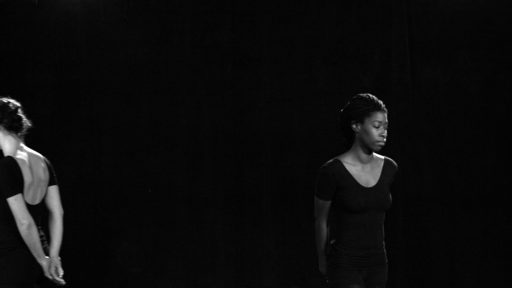
Our bodies belong to others; parents first, then lovers. A mother’s body belongs to her child. We are subjected to education systems; consumer desires demand to be satisfied through contracts of labour. Our bodies belong to institutions; institutions for criminals, the sick, and the insane; institutions in the end too, for all of us, via the medical, care, and funerary systems.
When we agree to participate in films, our bodies belong to the filmmaker. A contractual agreement places the image, sound – and by metaphorical extension – the body, in the ownership of the filmmaker. Its care is entangled with the politics of filmic history and filmic experience. The filmmaker’s own body is also invested, navigating space, time, and the ‘contaminated projections’ of their own ideologies. As we watch carefully, or repeatedly, our knowledge may be ruptured, our feelings disturbed.
In one way or another all the films in this programme deal with the mechanisms and technologies of entrapment: the destitute body, the incarcerated body, the body as a self-replicating system, bodies of soldiers performing military rituals, Greek mythology made contemporary through performative acts of defiance. Strategies in the pursuit of ‘realness’ range from injecting humour; others incite horror, follow a performative impulse, or straddle precariously on the ethical tightrope of representation. All point powerfully towards the condition of embodied subjects that have become specular, schizoid, internally disjointed. – Minou Norouzi
Featuring works by Alexander Lorenz, Nelmarie du Preez, Sirah Foighel, Daniel Mann, Eitan Efrat, Miranda Pennell, Chelsea Knight, Michel Wenzer, Yaron Lapid, Elise Rasmussen + Q&A with Chelsea Knight.
Followed by a discussion with artist Chelsea Knight, Minou Norouzi, and Jess Wilcox (Programs Manager of the Elizabeth A. Sackler Center for Feminist Art at the Brooklyn Museum).
Selected by Minou Norouzi, filmmaker, programmer, and doctoral candidate at Goldsmiths, University of London.
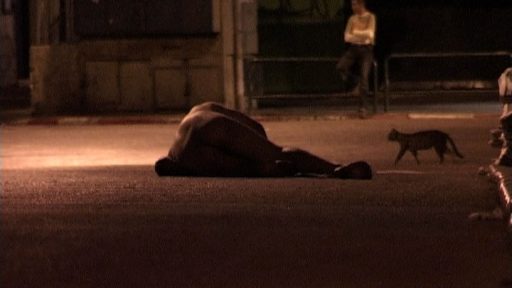
Arcadia, downtown | Yaron Lapid | Israel 2008 | Video | 15 min
Filmed in the lower depths of a Tel Aviv downtown, a naked man, drugged, bangs his head against concrete walls as he staggers and falls, trying aimlessly to regain control of his own body. The naked man, in his most degraded state, is observed by a local prostitute who tries to get help for him. His identity is not clear. What is he a victim of? The prostitute tells the camera her ordeal as she comes to his aid. Her intervention makes us shift our sympathies and emotional focus constantly.
In this dark piece the artist interrogates a variety of issues, from the performance of bodies through storytelling to the camera’s ability to show simultaneously raw and performative acts and behaviours. As the viewer becomes a performer, the film also explores the question of the film-maker as voyeur. – Julia Pascal
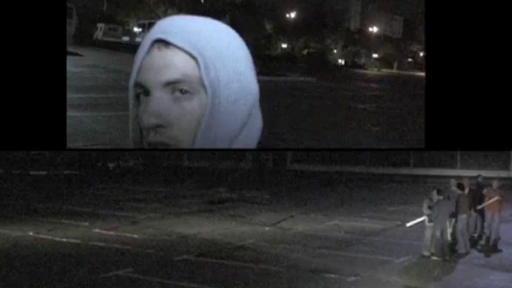
Complex | Daniel Mann and Sirah Foighel Brutmann & Eitan Efrat | Israel 2008 | Video | 9 min
On a rainy night, a group of young men slowly assemble in a dark parking lot. One by one they appear, greeted by a mutual hug, invoking the intimacy they once shared during their three-year service at the IDF ‘special forces’. Soon, their attention shifts to the concrete lot, where they find a sketch outlining the walls and niches of a contingent building. Equipped with cardboard cylinders to be held as guns, they are requested to “takeover” the ‘house’ with the techniques they exercised so thoroughly during their service. Resuming their combat positions, they meticulously plan the ‘raid’ before going into action.

Three Poems by Spoon Jackson | Michel Wenzer | Sweden 2003 | Video | 14 min
A poetic short film in three parts about Spoon Jackson – a man who has spent 25 years in prison. It is through poetry that he survives. A moving film that blends imagery with Spoon’s poetry recited over the phone. Voice and words: Spoon Jackson; poet, writer and actor, born in 1958 in California, USA. Sentenced to life imprisonment in 1977. Courtesy of Filmform
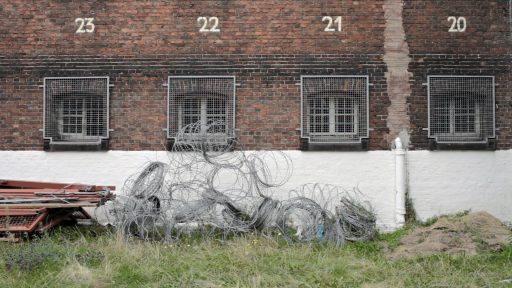
Von der Ordnung der Gesellschaft / Of the Order of Society | Alexander Lorenz | Germany 2013 | Video | 12 min 30s
Shot in a prison located in Düsseldorf, Germany, inaugurated in 1893, and considered modern in its day the filmmaker gained remarkable access to the now abandoned site. With all locks and technical installations removed, Of the Order of Society was filmed whilst accompanied by a voluntary guide, an ex-warden who used to work in that very prison. Shot formally to reflect the architecture of the space, the film is set to an adapted text from German Penal Law. Replacing the words “inmates” with “citizens”, and “prison” or “institution” with “society” affects greatly in extending from ‘inside’ the penal system to ‘outside’, society in general. The complete absence of human bodies may evoke projected reflections on day-to-day power relations. – MN
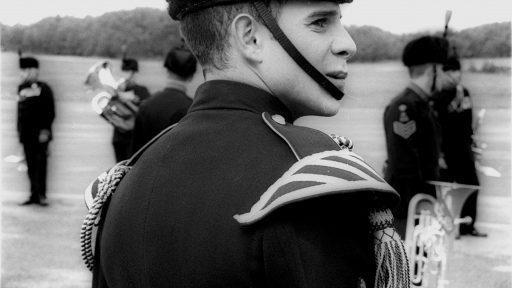
Tattoo | Miranda Pennell | UK 2001 | Video | 9 min
Trees, insects and birds look-on, as the countryside is invaded by a lost regiment of soldiers engaged in a repetitive display.
The ritual of military drill is by turns absurd and sinister. The soldiers of the Light Division perform a choreography that has been perfected and aestheticized in order to serve a function: to be effective. That is, the dual function of transforming many bodies into a single body, and of mesmerizing onlookers with their ‘stunning’ unity.
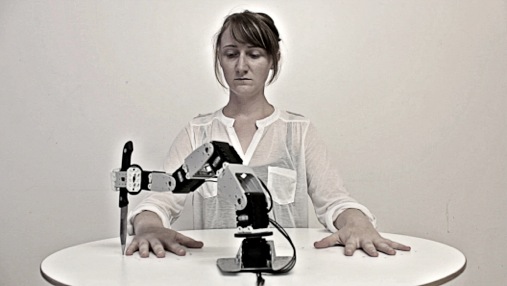
to stab | Nelmarie du Preez | UK 2013 | HD | 45s
For this work the artist established a ‘collective’ named ‘Du Preez/Gui’ between herself and her computer, where they stand as equal actors in a performance-based artistic collaboration. This work asks how a human-computer relationship might be useful in revealing questions with regards to ‘the self’ constituted by ‘the other’ in the mapping of relation. With the documented performance ‘to stab’, which forms part of the series ‘Loops of Relation’ (2013), the encounters and collisions between these two ‘bodies’ are presented, showcasing the fragility of relation.

I Lay Claim to You | Chelsea Knight | USA 2009 | HD | 4 min 45s
In I Lay Claim to You, Chelsea Knight invites choreographer Khalia Frazier to translate a text — appropriating themes from Margaret Mead’s 1938 description of a Balinese cremation — into a dance. In an improvised rehearsal, Frazier and Knight perform attitudes of identification: claiming and reclaiming ownership of the dancers and of each other. The dancers operate as a Chorus, mediating and transcribing the process. Knight conflates tropes of cultural inscription with the situation of a rehearsal to engage difference and sameness as changeable, conditional and contested categories, whose instability is political.
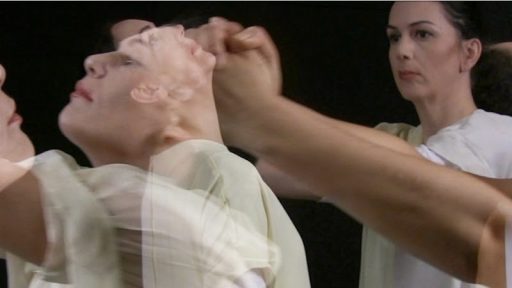
I Am Not a Man, Not Now | Chelsea Knight and Elise Rasmussen | USA 2009 | HD | 9 min
Elise Rasmussen and Chelsea Knight explore Antigone in its references to the roles of women in ancient Greece. They read the play as both proto-feminist and misogynous, where the protagonist engages in acts of brave civil disobedience, but is also used as an example of a stereotypical feminine tendency to feel rather than think. Rasmussen and Knight seek to draw attention to the way language is used against women in the play, its loss and gain of intention through time through translation, and its relevance today.